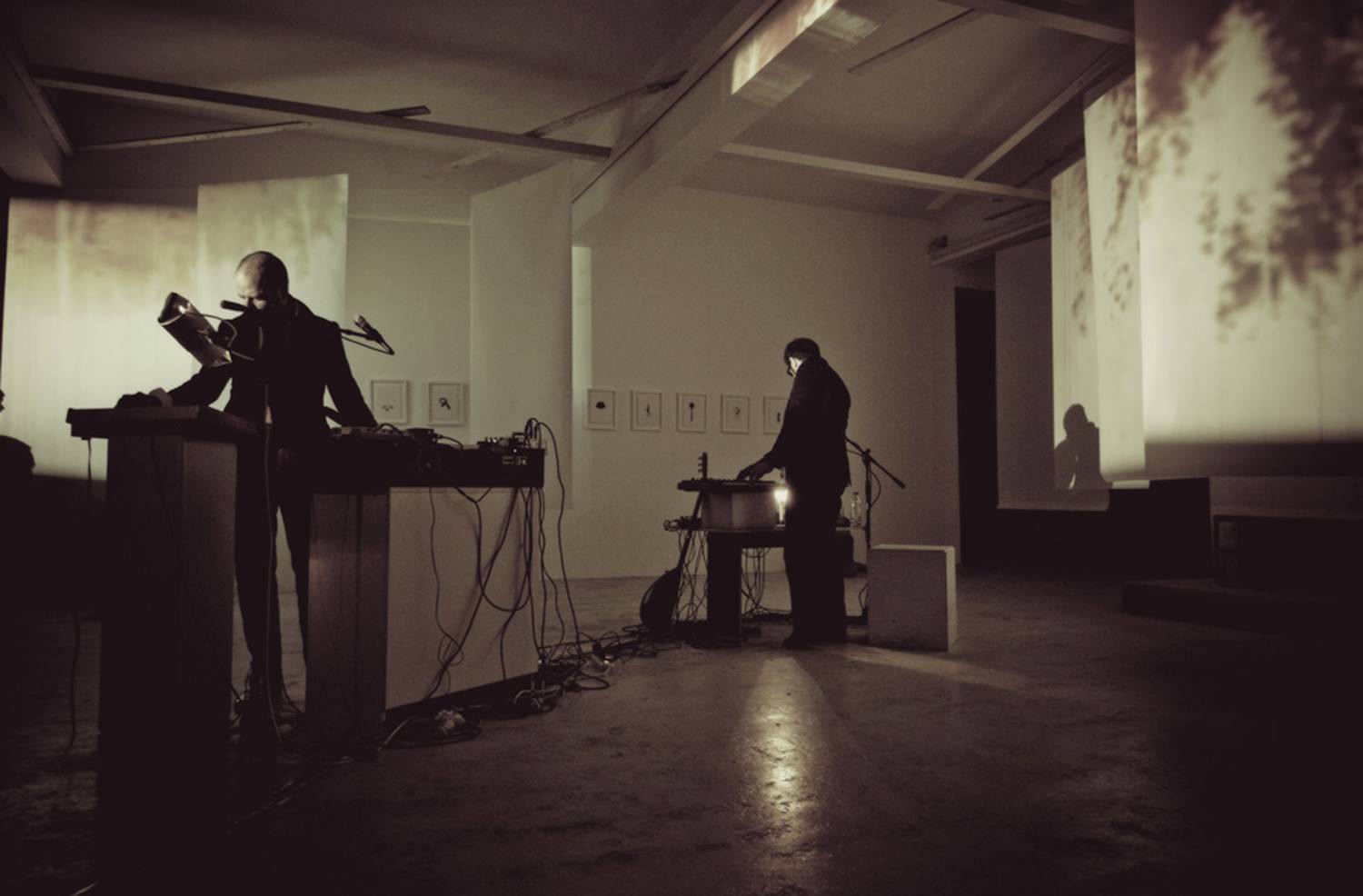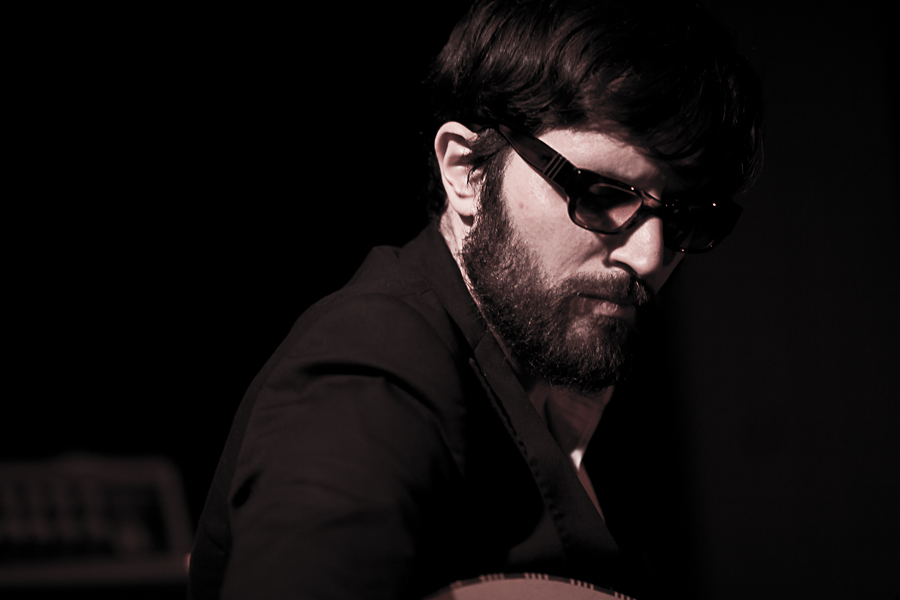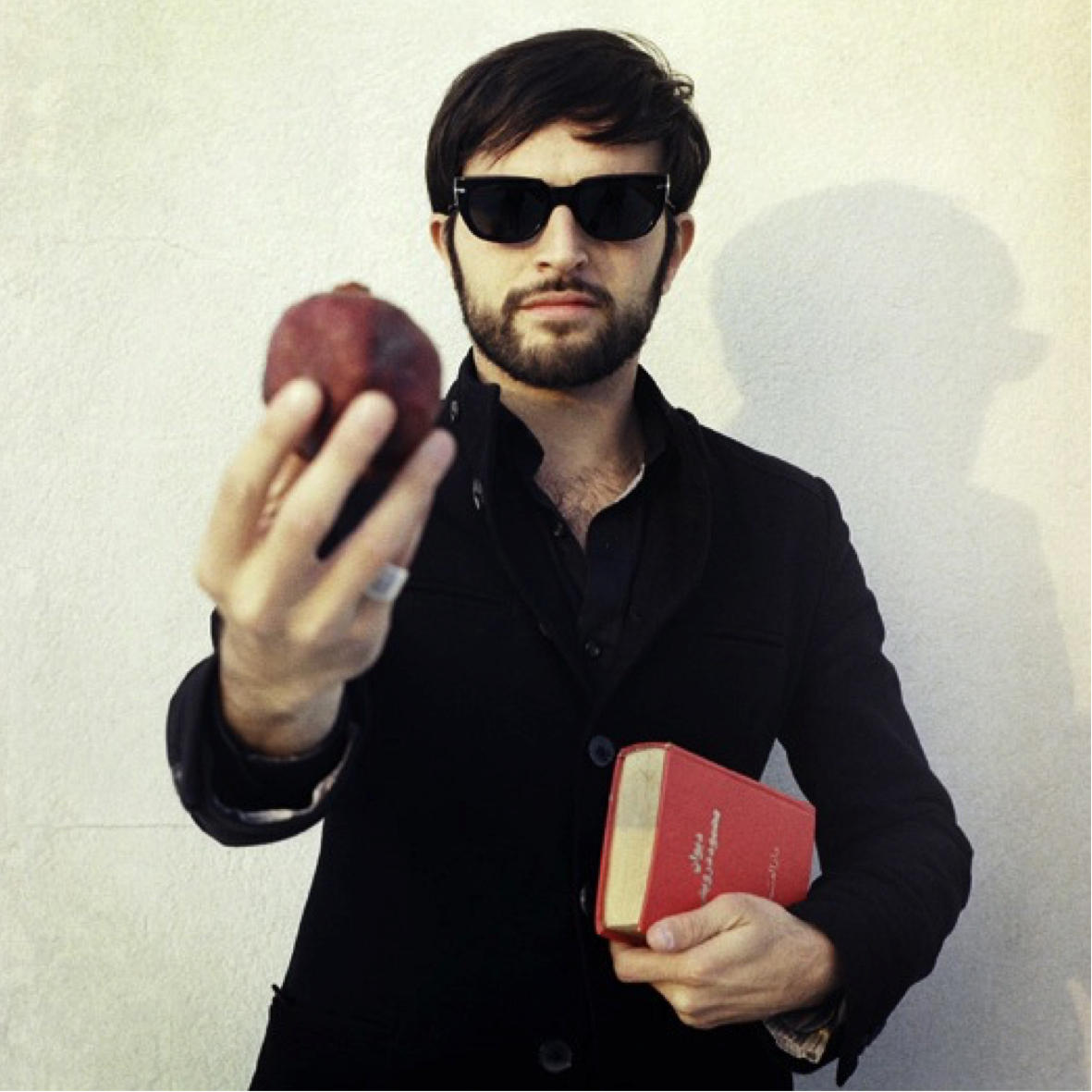Lebanese-Canadian musician Radwan Ghazi Moumneh on his band’s latest album
Founded in 2005 by Lebanese musician Radwan Ghazi Moumneh, the Montreal-based trio that comprises Jerusalem in My Heart naturally weave together traditional Arabic and electronic music to create their contemporary sound. Since Chilean visual artist and filmmaker Malena Salazar and the French musician and producer Jeremie Regnier came on board a few years back, they’ve fine-tuned the project to create something strikingly unique. Though their live performances are a rarity, with concerts usually held no more than twice a year (due to Moumneh’s hectic schedule as a sound engineer and producer at his Hotel2Tango recording studio), the band have nonetheless become known for their mesmerising shows that blur the lines between audio and visual, with cinematic visuals and light-based projections.
Their new album, Mo7it Al-Mo7it, marks the first time their live experience has been translated to record. Littered with literary and musical references, symbolism, and subtle sociopolitical commentaries, Moumneh’s lyrics, sung melismatically, are what give the album its powerful emotional charge. Though the album has a real connection to the past, the result is something markedly contemporary. With a European and North African tour in the pipeline, I spoke with Moumneh about the ‘roots’ of the record.
What was the original concept behind the project when you started out, and how has that evolved?
Initially, I had this vague idea of a project based on certain Arabic modes, this sort of contemporary experimental Arabic music that didn’t dive too much into abstract electronics. That was the seed, and it took a long time before it shaped into something coherent. Because I’m such a busy work person, my own music always gets pushed to the side. The concept has always been the same, but of course, the aesthetics and the material have changed drastically. The shift from my friend Carl, who was doing the visuals but who could no longer commit, to Malena Salazar was quite huge. Once Malena and I did a few practices together, we started clicking on an aesthetic, a vision. That’s when I felt it was going somewhere.
What defines your live performances?
When it comes to the visuals, our live performance isn’t [about] one flat screen where we project images; it’s [about] multiple projectors, and … the deconstruction of the architecture of a space. We use [the projectors] as a sort of canvas, starting out with light, and then adding visuals.

The name of the group seems slightly provocative. Why did you decide on Jerusalem In my Heart?
The name is straight … from a Fairuz record. It’s actually not a very good record, but it was [about] more [than] what the name conjured up. Knowing that this was going to be a project based out of Montreal, the name felt like a really apt fit to the idea behind [it]. Referring to a city that Islam, Judaism, and Christianity can all have as a reference point gives a sort of ambiguity about the artistic statement behind it.
You’ve been performing as Jerusalem In My Heart for around eight years. Why only now have you decided to translate the live performance to record?
The project has been morphing ever since I started. About a year and a half ago, things got really solid, and I felt like the project was going somewhere interesting, conceptually. It had been on the table from Constellation Records to create a record, and I was just resisting doing it. The record was initially born out of the desire to get an agent to book some performances in Europe and North Africa; without a record, it’s virtually impossible. That pushed me to sit down, collect the ideas, and see what could translate into an actual album. The record is kind of a compromise; [the music] is a part of the show of course, but it’s far from [being] the whole thing.
What musicians did you collaborate with on the album?
There are two pieces on the record that I just completely improvised, one with virginal player Dina Cindric, and another with harpist Sarah Page. [The songs] just came [from] hanging out with the two musicians, attuning their instruments to playing in quarter tones, and experimenting with those modes. When I played [the songs] a couple of months later, I was just like, wow. We wouldn’t have been able to recreate them in the studio, so I decided to use them as they were.
The rest of the album was just done by myself in the apartment. I own a recording studio, half a block from where I live, but I just couldn’t get myself to record it there. I actually made the record while I was recording Mashrou’ Leila’s album. We were in the studio from 9 am to 10 pm. I’d come home, go to bed, wake up at 4 am, and work till 9 am.
Did these early morning recording sessions in the intimacy of your own apartment have a big effect on the atmosphere of the album?
Sure – I’m very much a morning person. I would wake up and just dive straight into it. I love that feeling of being awake and feeling the sun come up. I sound a bit like a hippy, I know, but this energy that you can harness really drives me. It was a really rough 10 days though – [I was] losing my mind.
‘The Shepherd but not the Sheep’ … To me, it’s a sort of obvious reference to Lebanon: we’re surrounded by all these ‘shepherds’, and the rest of us are just the ‘flock’ who are not cared for
Your vocals have a tarab-esque quality. Have you been inspired by any singers in particular?
The first piece on the record, Koll Lil-Mali7ati Fi Al-Khimar Al-Aswadi (Speak of the Woman in the Black Robe), is a straight up cover. It’s a poem that was written in Aleppo in the 9th century A.D., and it’s been done many times by classical Arabic singers. The first time I heard it was by an Iraqi singer from the 40s called Nazem El-Ghazali. The emotion hit me so hard. Over the entire recording process I was [also] listening a lot to Sabah Fakhri. I am just in love with him and his style of singing. I can’t even compare myself to his toenail, but the feelings that stayed with me after I’d listen to him, I would bring back to the recording.

Courtesy Tanya Traboulsi
There are lots of religious references in the lyrics on the album – can you talk us through them?
The first song has a lot of intepretations. It’s about this man who has an encounter with a woman dressed in black robes, who metaphorically blocks his path into the mosque. She’s the hurdle between him and his connection with God, fasting, and piety. It’s an absolutely beautiful piece of poetry. The third track, Yudaghdegh El-ra3ey Walal-Ghanam, is one repeated phrase that loops over and over these layers of synthesisers, kind of going nuts. The title translates to ‘The Shepherd but not the Sheep’. To me, it’s a sort of obvious reference to Lebanon: we’re surrounded by all these ‘shepherds’, and the rest of us are just the ‘flock’ who are not cared for.
The next song is called 3anzah Jarbanah. It’s about a sick, diseased goat. It’s from the perspective of the goat; it’s dying, mentally, emotionally, and physically, and it doesn’t count for anything.
Intense.
Yeah [laughs]. They’re not happy lyrics. The last song is called Amanem. A man questions the confusing relationship that he as a disciple has with God. I don’t want to seem like a religious person [though] because I’m far from [being one].
So it’s the symbolism that interests you?
Of course – it relates to our culture. It’s what part of our problems, socially and politically speaking, are related to – all the things that our culture suffers from.
What’s behind the album title, Mo7it Al-Mo7it?
It [refers to] a book written by Butrus al-Bustani. It’s officially translated as ‘Circumference of the Ocean’, but it might be more relevant to translate it as ‘Ocean of the Ocean’. It’s a renaissance book that was part of the first wave of Arab intellectualism. [Butrus al-Bustani] was an educator and a philanthropist, a very interesting character. The book is considered to come in somewhere between a dictionary and an encyclopedia – it’s so vast. This is my little humble attempt at shining a light on that.
Has much of Montreal’s underground music scene rubbed off onto your work?
I’m so implicated in the independent music scene in Montreal. It’s funny that this kind of music is like my bread and butter, but it’s not necessarily music that I gravitate towards – it’s just music that I happen to be good at when producing and recording. The [Jerusalem in My Heart] project actually has quite a solid support base in Montreal, and I’m lucky for that.
Having a perspective on other music scenes around the world, do you think Beirut has a strong experimental music scene?
The people who run Irtijal (an international festival of experimental music], the whole scene of these incredibly dedicated people who just make that machine run … for me, it’s so heartwarming. The festival has been going for 13 years, and the material that comes out of [it] is absolutely wonderful. [They’re] the most genuine people doing it for the absolute right reasons, and [are] doing a kick-ass job in creating and organising [everything].
What else are you working on at the moment?
Oh my God – there’s no shortage of things to work on, ever. I’ve taken a break from my studio work, because I’ve just been firing it for so many years now, and I want to focus on my own work. We are doing a full European and North African tour soon. I’m also taking a stab at scriptwriting. I spend a lot of my waking hours thinking about it. [I’m thinking of writing a script for] a historical film based on the book Stories and Scenes from Mount Lebanon, written by Mahmoud Khalil Saab. He only wrote one book, and it was published just after his death in 1976. The book just absolutely blows my mind. It all takes place between 1820 and 1920, and recounts various stories of different personalities in Mount Lebanon. There’s finesse to the way it was written, but sadly the book has [received] zero recognition in Lebanon.
So it’s a way of you moving back to Lebanon?
Well, it’s sort of my way of scheming to live in Lebanon and not get a job. If I can find enough money for this to happen, that would be ideal. I do not pretend for a second that I know what I’m doing, but cinema is something that’s a big part of me, an extreme passion.
Cover image courtesy Tanya Traboulsi.

